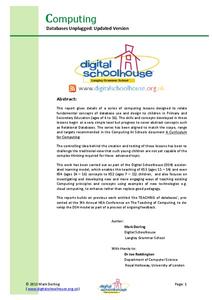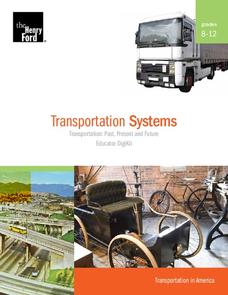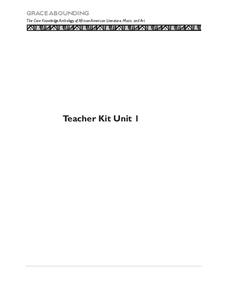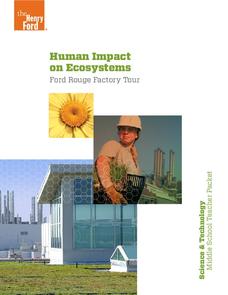New York City Department of Education
Colonial America and The American Revolution
How did the founding of the American colonies lead to a revolution? Use the essential question and sample activities to guide learners through a series of history lessons. Additionally, the packet includes effective strategies to...
Cleveland Metro School District
Novel Lesson for The Giver
Lois Lowry's The Giver is one of the most engaging and thought-provoking works of literature in the middle school curriculum. Round out your novel unit with a collection of reading activities, comprehension questions, memoir and...
Annenberg Foundation
Making an Issue-Based Video
Encourage class members to become engaged citizens by researching an issue they are passionate about and then producing a video to present to policymakers, the public, and their peers. Everything needed for the unit is contained in...
Curated OER
Unit Plan for The Catcher in the Rye —A “Place-Based” Approach
"People never notice anything." As part of their study of The Catcher in the Rye, class members adopt Holden Caulfield's approach and spend time as quiet observers of their surrounding, recording their observations/reflections in a...
Los Angeles Unified School District
River Systems
Scholars must react to the ecosystems of a river. They use inquiry-based learning along with maps and visuals to better understand the impact of rivers on everyday life. To finish, they create final written projects and presentations.
University of California
Euclidean Geometry
Go back to where it all began! Investigate how axiomatic systems and Euclidean geometry are based on undefined terms, common notions, postulates, and propositions by examining passages from Euclid's Elements. (Social studies teachers...
Gwinnett County Public Schools
Analysis of the Tuck Everlasting and The Birchbark House Text Exemplars
Looking to introduce some text-based questions into your ELA lessons? Practice the kinds of skills the Common Core demands with the seven text-based questions and the essay prompt provided here. Designed to be a three-day lesson, day one...
PBS
Blow the Roof Off!
Blow the minds of young scientists with this collection of inquiry-based investigations. Based on a series of eight videos, these "hands-on, minds-on" science lessons engage young learners in exploring a wide range of topics...
Microsoft
Microsoft Computer Applications
From creating and editing workbooks in Microsoft Excel to designing presentations using Microsoft PowerPoint and documents in Microsoft Word, this is your one-stop, must-have resource for lessons on Microsoft Office (2010).
Intel
Energy Innovations
Collaborative groups examine the importance of energy resources on quality of life by researching different energy sources and alternative energy sources through data analysis. They make a comparison of different countries and cultures,...
Computer Science Unplugged
Computing: Databases Unplugged
How do databases store and retrieve information? The activities in the resource provide fundamental concepts of databases by introducing an approach that teaches the basics without using computers. The pupils act as the actual data...
Henry Ford Museum
Transportation Systems
Learners analyze the evolution of cultural attitudes through the lens of transportation, examining several artifacts, documents, and photographs. Topics covered include how American attitudes have influenced society's evolution into a...
Out-of-School Time Resource Center
Nutrition and Physical Activity
Emerging nutritionists explore what it means to be healthy. In the beginning of the unit, your class will examine the five food groups and learn how food gets from the farm to our plates. This leads into the investigation of...
State of Victoria Department of Education and Early Childhood Development
The Long Wall of China
While some aspects of the Great Wall of China are known, other parts of its story are obscured by time. A research lesson asks scholars to consider what we know and don't understand about this wonder of the world. The class then compiles...
Houghton Mifflin Harcourt
The Progressive Era: Muckrakers
Using Upton Sinclair's The Jungle, guide your class in the process of identifying unknown terms using context clues and formulating text-based answers. The lesson plan includes a useful worksheet incorporating scaffolding questions on an...
Intel
Insects: The Good, The Bad, The Ugly
What would the world be like with no insects? Ponder this question using a research-based STEM unit that encourages scholars to investigate insects from both a beneficial and hazardous perspective. They learn about insect behaviors,...
C.S. Lewis Foundation
Educator’s Guide to The Lion, The Witch and the Wardrobe #1
Perfect for both classroom and homeschool settings, this 72-page resource packet, designed for C.S. Lewis's The Lion, The Witch and the Wardrobe, is a must-have for your curriculum library. Chapter-by-chapter vocabulary lists and...
Curated OER
Teacher Kit Unit 1
Nine lessons makeup a unit designed to reinforce grammar and vocabulary through practice pages based on readings of African folktales. Each lesson consists of a mini lesson, a vocabulary review, and a worksheet. Topics include...
Henry Ford Museum
Human Impact on Ecosystems
An environmenta science unit includes three lessons plus a cumulative project covering the ecosystem. Scholars follow the history of the Ford Rouge Factory from its construction on wetlands and how it destroyed the...
Curated OER
Fieldwork Basics Overview
Put your feet up and grab a cup of coffee before going through this extensive field work unit plan! Based on folklorist studies of traditional culture and ethnography, several activities focus on topics such as cultural sensitivity;...
Intel
What Does This Graph Tell You?
What can math say about natural phenomena? The fifth STEM lesson in this project-based learning series asks collaborative groups to choose a phenomenon of interest and design an experiment to simulate the phenomenon. After collecting...
Intel
Lights, Camera, Reaction!
Excite classes with a STEM project-based learning lesson covering chemical reactions. Groups study the different types through simulations and hands-on activities. They pick one type (synthesis, decomposition, single displacement, double...
Intel
Cell-to-Cell
The third in a series of 10 STEM project-based lessons focuses on cells types, functions, and physiology. Through research, discussions, writings, and presentations, groups learn about the difference between plant and animal cells, the...
Intel
Biomes in Action
A STEM project-based learning lesson, number four in a series of 10, focuses on human impacts to biomes around the world. Groups work together as environmentalists to research a specific biome, investigating human impacts on it. From...























